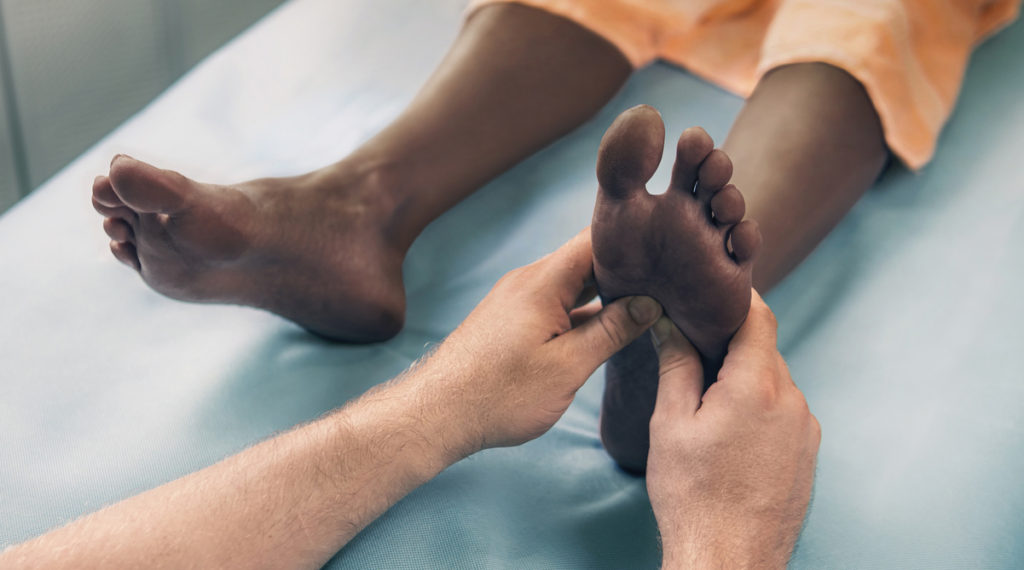How does diabetes affect your feet? Doctor Q&A
If you’re diagnosed with diabetes (whatever type), it’s important to be aware of how this can affect your body. However, the amount of information to take in when you have diabetes can sometimes be overwhelming, which is why we’ve started a Doctor Q&A series which answers some popular questions about diabetes.
Our Medical Director, Richard, has taken some time to outline the key points of how diabetes can affect your feet. Read more below.

Does diabetes affect your feet?
Having diabetes means you’re at much greater risk of developing foot problems. This is because, when your sugar levels are too high, this can damage the feeling in your feet. High sugar levels can also affect your circulation meaning you are getting less blood supply to your feet. Without a good blood supply, you may have problems with cuts and sores healing, and you may also get cramps and pain in your legs or feet.
It’s really important to check your feet regularly and attend your annual foot check with your healthcare professional, as most foot problems can be prevented with good foot care and regular checks. However, if you don’t get these foot problems treated, they could lead to foot ulcers, infections and, at worst, amputations.
Will diabetes cause your feet to swell and why?
Persistent high blood glucose levels (hyperglycaemia) can damage the lining of smaller blood vessels. This damage can result in poor blood circulation and in turn, this can result in swollen feet and ankles. This happens when your blood doesn’t circulate properly and fluid gets trapped in certain parts of your body, such as the legs, ankles, and feet. This excess fluid that builds up in the body tissue which is known as oedema.
What can you do to prevent diabetic foot problems?
Preventing foot problems is essential if you have diabetes. Undertaking regular self-checks and attending your annual foot check are the best way to prevent common foot problems from occurring.

Here are some ways that you can protect your feet in further detail:
- Check your feet daily by doing it yourself or asking someone to help you. You/they should be looking for any changes or injuries. If you’re checking on yourself and cannot lift your legs, use a mirror to look at the soles of your feet.
- Clean your feet daily: Keep your feet clean and dry thoroughly (including between your toes).
- Wear supportive shoes and socks: Do not apply socks so snugly that they restrict blood flow and make sure your shoes are the correct size and are wide enough.
- Trim nails carefully: Trim toenails straight across, keeping them short and using a nail file for the edges.
- Protect feet from extreme temperatures: Exposure to extreme hot and cold can damage your feet. It’s also a good idea to avoid walking around bare foot.
- Attend your annual foot check: Regular examinations by a healthcare professional are key to preventing infections, amputations, and severe deformities.
- Control blood sugar: Uncontrolled blood sugars increase the risk of neuropathy and foot problems, so keeping your blood sugar levels in check is going to help.
- Avoid smoking: Smoking can affect the blood supply to the tissues, which can make foot problems worse in people with diabetes.
If you have any further questions about any of the topics discussed above, please contact your diabetes registered healthcare professional.
—-
At Spirit Pharmacy, we’re here to help people who live with diabetes get access to their medicines, helpful items, and expert advice. We offer a friendly NHS prescription free home delivery service, alongside lots of additional services and support, especially tailored for people living with diabetes.
Please note, this article is not intended to be individual healthcare advice. Always follow specific advice relating to your condition given to you by your doctor, pharmacist, diabetic nurse, or dietician.
*Information correct at time of issue – March 2022


